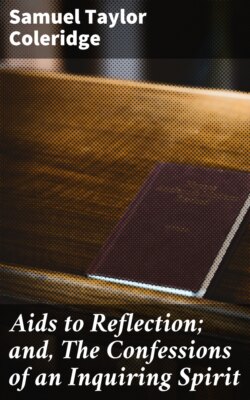Читать книгу Aids to Reflection; and, The Confessions of an Inquiring Spirit - Samuel Taylor Coleridge - Страница 40
На сайте Литреса книга снята с продажи.
Comment.
ОглавлениеHerein the apostle places the pre-eminence, the peculiar and distinguishing excellence, of the Christian religion. The ritual is of the same kind, (ὁμοουσιον) though not of the same order, with the religion itself—not arbitrary or conventional, as types and hieroglyphics are in relation to the things expressed by them; but inseparable, consubstantiated (as it were), and partaking therefore of the same life, permanence, and intrinsic worth with its spirit and principle.
[24] See the epistle of St. James, i. 26 27, where, in the authorized version, the Greek word θρησκεια is falsely rendered religion; whether by mistake of the translator, or from the intended sense having become obsolete, I cannot decide. At all events, for the English reader of our times it has the effect of an erroneous translation. It not only obscures the connexion of the passage, and weakens the peculiar force and sublimity of the thought, rendering it comparatively flat and trivial, almost indeed tautological, but has occasioned this particular verse to be perverted into a support of a very dangerous error; and the whole epistle to be considered as a set-off against the epistles and declarations of St. Paul, instead of (what in fact it is) a masterly comment and confirmation of the same. I need not inform the religious reader, that James i. 27, is the favourite text and most boasted authority of those divines who represent the Redeemer of the world as little more than a moral reformer, and the Christian faith as a code of ethics, differing from the moral system of Moses and the prophets by an additional motive; or rather, by the additional strength and clearness which the historical fact of the resurrection has given to the same motive.
[25] The Greek word εγενετο, unites in itself the two senses of began to exist and was made to exist. It exemplifies the force of the middle voice, in distinction from the verb reflex. In answer to a note on John i. 2., in the Unitarian version of the New Testament, I think it worth noticing, that the same word is used in the very same sense by Aristophanes in that famous parody on the cosmogonies of the Mythic poets, or the creation of the finite, as delivered, or supposed to be delivered, in the Cabiric or Samothracian mysteries, in the Comedy of the Birds.
—— γενετ Ουρανος, Ωκεανος τε Και Γη.
[26] James i. 25. Ο δε παρακυψας εις νομον τελειον τον της ελευθεριας. The Greek word, parakupsas, signifies the incurvation or bending of the body in the act of looking down into; as, for instance, in the endeavour to see the reflected image of a star in the water at the bottom of a well. A more happy or forcible word could not have been chosen to express the nature and ultimate object of reflection, and to enforce the necessity of it, in order to discover the living fountain and spring-head of the evidence of the Christian faith in the believer himself, and at the same time to point out the seat and region, where alone it is to be found. Quantum sumus, scimus. That which we find within ourselves, which is more than ourselves, and yet the ground of whatever is good and permanent therein, is the substance and life of all other knowledge.
N.B. The Familists of the sixteenth century, and similar enthusiasts of later date, overlooked the essential point, that it was a law, and a law that involved its own end (τελος), a perfect law (τελειος) or law that perfects or completes itself; and therefore, its obligations are called, in reference to human statutes, imperfect duties, i.e. incoercible from without. They overlooked that it was a law that portions out (Νομος from νεμω to allot, or make division of) to each man the sphere and limits within which it is to be exercised—which as St. Peter notices of certain profound passages in the writings of St. Paul, (2 Pet. iii. 16.)—oι αμαθεις και αστηρικτοι στρεβλουσιν, ὡς και τας λοιπας γραφας, προς την ιδιαν αυτων απωλειαν.
